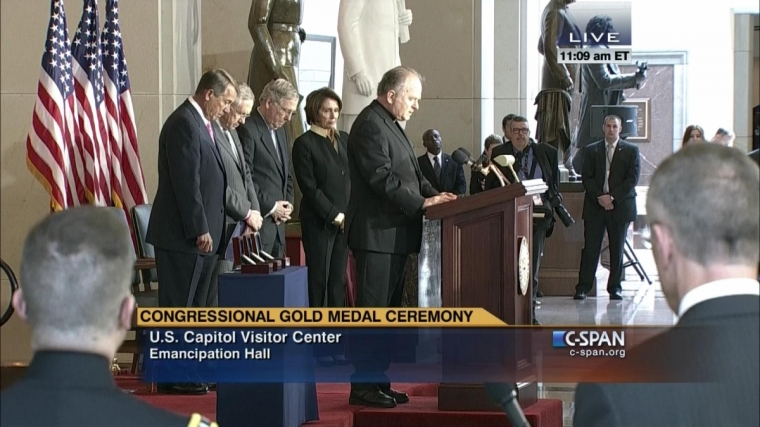Atheists sue U.S. House of Representatives chaplain on National Day of Prayer

WASHINGTON (Christian Examiner) – On the same day many Americans of different faiths were praying – on the National Day of Prayer May 5 – the Freedom from Religion Foundation was filing a lawsuit against U.S. House of Representatives Chaplain Patrick Conroy.
According to the lawsuit, Father Conroy, a Jesuit Catholic priest, would not allow FFRF's Co-President Dan Barker, a former minister who now professes atheism, to offer a "secular" invocation before the House. Barker had been invited in February 2015 to offer the invocation by Rep. Mark Pocan, who represents the district of Madison, Wisconsin.
Almost a year later (in January 2016), Conroy's office notified Barker he could not deliver the invocation because the chaplain's office requires guest chaplains to be ordained and submit an ordination certificate and the content of their prayer, which must at least reference a "higher power."
Conroy also noted, the filing said, that Barker had renounced his father and was no longer a "true minister of the gospel" entitled to appear before Congress.
Barker, however, insists that his ordination certificate – received at the onset of his 19 years in ministry for a religion to which he no longer adheres – is still valid. He also submitted at the time a prayer which, according to the suit, referred to "We, the People of the United States" as the only "higher power."
The lawsuit claims that Conroy "has imposed requirements for guest chaplains that discriminate against the nonreligious and minority religions, and has explicitly refused to allow Plaintiff Dan Barker, who actually met the requirements, to serves as guest chaplain because Barker is nonreligious."
The filing also claims that Barker believes only in the power of reason, rather than "the supernatural," and "there is no governing entity behind Barker's deeply and sincerely held beliefs that issues ordinations."
Other members of the House are also included in the lawsuit, as is Speaker of the House Paul Ryan. Barker alleges discrimination against "non-believers" because no non-believer has ever been invited to offer an invocation. Non-believers, he claims, "constitute one-fourth of the U.S. population."
That figure, however, is grossly overstated.
According to the latest Pew Research Center Religious Landscape Survey, 22.8 percent of Americans classified themselves as "religiously unaffiliated" or, in other words, perhaps religious but unattached to a denomination or historic religion. Within that segment, only 3.1 percent classified themselves as atheists, while another 4 percent claimed to be "agnostic."
Still, FFRF's complaint alleges that 97 percent of the prayers over the past 15 years have been offered only by Christian ministers, while 2.7 percent were offered by Jewish rabbis and less than one-half a percent were offered by Muslim or Hindu religious leaders.
The chaplain's office for the U.S. House coordinates religious services for House members who adhere to a variety of religions. A schedule of House religious services reveals that Anglican, Baptist, Catholic, Christian Science, Episcopal, Greek Orthodox, Lutheran, Methodist, Non-denominational, Orthodox, Presbyterian, Quaker, Reformed and Seventh-Day Adventist services are coordinated on a regular basis. Non-Christian services, including, Jewish, Muslim, Buddhist and Mormon services, are also provided. The chaplain's office does not provide services for "non-believers" who, according to the definition of non-belief, do not have religious services.
Barker alleges in the complaint that Conroy is violating his First Amendment rights, the Establishment Clause of the U.S. Constitution and Article VI, Section III of the Constitution, which prohibits a religious test for public office holders or public trusts.
Congress first elected a chaplain in 1789 and convened each day's business with a prayer, though some of the nation's founders, including James Madison, questioned the constitutionality of the practice. The chaplaincy has been challenged by secularists and atheists on numerous occasions, but the U.S. Supreme Court upheld the practice of retaining chaplains for the legislature in Marsh v. Chambers in 1983.
In the case, Chief Justice Warren Burger argued that chaplaincy was "simply a tolerable acknowledgment of beliefs widely held among the people of this country."
In 2014, the high court also upheld prayers of invocation at legislative or city council meetings in Town of Greece, N.Y. v. Galloway, primarily because the town "at no point excluded or denied an opportunity to a would-be prayer giver" (minister, layperson, or atheist) to offer a prayer.
It is on that basis that Barker has demanded the opportunity to pray.
The timing of the lawsuit filed by FFRF was also not coincidental. According to the filing, the group claims it took "satisfaction in filing this lawsuit on the National Day of Prayer."
The National Day of Prayer was enacted by Congress at the encouragement of evangelist Billy Graham in 1952. Each year, the president issues an official proclamation encouraging Americans to pray for their country. FFRF claims the law is unconstitutional.
In this year's presidential proclamation, President Barack Obama said prayer sustains Americans of all walks of life "through great uncertainty and moments of sorrow" and "allows us an outlet for introspection, and for expressing our hopes, desires and fears."
"It offers strength in the face of hardship, and redemption when we falter. Our country was founded on the idea of religious freedom, and we have long upheld the belief that how we pray and whether we pray are matters reserved for an individual's own conscience," Obama said. "On [the] National Day of Prayer, we rededicate ourselves to extending this freedom to all people."